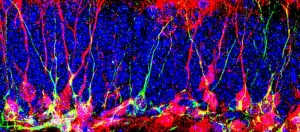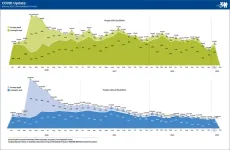(Press-News.org) **Strictly embargoed until 19:00 (GMT) Wednesday 1 March 2023**
Scientists discover how to prevent death of nerve cells in most common forms of MND and dementia
Researchers from the University of Sheffield’s Institute of Translational Neuroscience have discovered how to prevent the death of nerve cells and protect nerves from neurodegeneration in the most common forms of MND and frontotemporal dementia
The researchers used a peptide, a small assembly of amino acids or protein bricks, with a cell-penetrating module to stop mutant repeated RNA molecules being transported from the cell's nucleus to the cytoplasm where they are used to produce toxic repeat proteins which lead to the death of nerve cells
Findings of the study suggest the peptide could be given orally in a non-invasive manner - for example through a nasal spray which could be developed to enter the brain
The groundbreaking concept of using peptides to block the nucleus-to-cytoplasm transport of the damaging repeat expanded RNA could transform how some neurodegenerative conditions, which currently have no cure, are treated
Scientists have found a novel way to block the transportation of mutant RNA and subsequent production of toxic repeat proteins which lead to the death of nerve cells in the most common subtypes of motor neurone disease (MND) and frontotemporal dementia (FTD).
The new study, conducted by researchers at the University of Sheffield’s Institute of Translational Neuroscience (SITraN), also showed that using a peptide to stop the transport of mutant repeated RNA molecules and production of toxic repeat proteins actually increases the survival of C9ORF72 nerve cells - protecting them against neurodegeneration.
The Sheffield team previously discovered the abnormal transportation of the rogue RNAs copied from the C9ORF72 gene - known to be the most frequent cause of MND and FTD - is caused by excessive stickiness of a cell transporter named SRSF1.
Instead of using conventional drugs, which are inefficient in disrupting the stickiness of the SRSF1 protein, or invasive therapies to edit or modulate the activity of defective genes, the new study found that a small peptide incorporating a cell-penetrating module can stick to SRSF1 and effectively block the transportation of the rogue repeat RNA.
The peptide is composed of a short chain of amino acids or bricks found within our cells and tissues in the body.
Interestingly, the findings, published in the journal Science Translational Medicine also suggest the peptide could be given to MND and FTD patients orally in a non-invasive manner - for example through a nasal spray which could be developed to enter the brain.
This groundbreaking concept of using peptides to block the effects of the damaging repeat expanded RNA and toxic repeat proteins could transform how some neurodegenerative conditions which currently have no cure are treated.
Professor Guillaume Hautbergue, Professor of Translational RNA Biology at the University of Sheffield, who led the study said: “When we tested our innovative approach by adding the peptide to the food eaten by fruit flies not only did the peptides block the damaging mutations which cause MND and FTD from being transported to the cell's nucleus, we actually saw an improvement in their neurofunction.
“This means the peptide is effectively blocking the progression of the neurodegenerative condition and also helping to restore the function to the affected nerve cells.
“This concept of using peptides to block destructive mutations unlocks such an exciting and innovative treatment pathway which until now has not been explored by scientists.
“MND and FTD are devastating diseases which currently have no cure. This is a promising alternative to conventional small molecule drugs which are often limited by poor penetration of the blood-brain barrier.”
FTD occurs when nerve cells in the frontal and temporal lobes of the brain are lost, causing the lobes to shrink. FTD most commonly affects people aged 45-65 and can affect behaviour, personality, language and movement. There is no cure for FTD, and no treatments available to slow or stop the progression of the disease.
MND is a debilitating condition that destroys the cells that control movement, leaving sufferers unable to move, walk, talk and eventually breathe. Treatments are very limited and there is no cure. Most patients with the disease are only expected to live two to five years after diagnosis. This study was made possible thanks to donated tissue samples from the skin of MND patients which were reprogrammed into nerve cells.
Dr Brian Dickie, Director of Research at the MND Association, said: “These findings from a world leading research team in Sheffield demonstrate the importance of funding fundamental ‘discovery’ science. This work has provided important evidence in support of a completely new strategy to treat the most common inherited cause of both MND and FTD, with the ultimate goal of developing effective therapies for these devastating diseases.”
It is hoped the innovative research, conducted in collaboration with multiple labs in SITraN and with the groups of Dr Alexander Whitworth (University of Cambridge), Dr Cyril Dominguez (University of Leicester), Professor Frédéric Allain (ETH Zurich) and funded by the MND Association and the UKRI BBSRC and MRC councils will transform the future of clinical trials for the most common forms of MND and FTD within the next few years.
ENDS
Notes for editors:
This research was pump-primed by a MND Association biomedical grant and further supported by UKRI through BBSRC and MRC New Investigator research grants.
Media contact: For more information please contact: Amy Huxtable, Media and PR Officer, University of Sheffield, 07568116781, a.l.huxtable@sheffield.ac.uk
END
Scientists discover how to prevent death of nerve cells in most common forms of MND and dementia
2023-03-01
ELSE PRESS RELEASES FROM THIS DATE:
Obstacles for breast cancer prevention in high-risk Black women
2023-03-01
Black women at high risk of breast cancer face a variety of obstacles that may keep them from care that could prevent cancer and increase the chances they’ll survive if they develop the disease, new research has found.
A study from researchers at The Ohio State University provides insights into the factors that contribute to racial disparities in use of preventive measures, including genetic testing, prophylactic mastectomies and medication to thwart breast cancer.
In the new study, which appears today (March 1, 2023) in the journal PLOS ONE, the ...
Waxing and waning of environment influences hominin dispersals across ancient Iran
2023-03-01
A world-first model of paleoclimate and hydrology in Iran has highlighted favourable routes for Neanderthals and modern human expansions eastwards into Asia.
Published in PLOS ONE, the findings reveal for the first time that multiple humid periods in ancient Iran led to the expansions of human populations, opening dispersal route across the region, and the possible interactions of species such as Neanderthals and our own Homo sapiens.
Professor Michael Petraglia, a key researcher in the study, said historic humid ...
Vitamin B5 could help improve red blood cell production in people with Myelodysplastic syndromes
2023-03-01
Queen Mary University of London and Francis Crick Institute press release
Under strict embargo: 19:00hrs GMT Wednesday March 1, 2023
Peer reviewed
Experimental study
Cells
Vitamin B5 could help improve red blood cell production in people with Myelodysplastic syndromes
Scientists from Barts Cancer Institute at Queen Mary University of London and the Francis Crick Institute, have uncovered why patients with a rare type of blood cancer suffer from ineffective red blood cell production, and how vitamin B5 could be combined with existing drugs to improve outcomes.
Myelodysplastic syndromes (MDS) are a type of blood cancer characterised ...
How to generate new neurons in the brain
2023-03-01
Some areas of the adult brain contain quiescent, or dormant, neural stem cells that can potentially be reactivated to form new neurons. However, the transition from quiescence to proliferation is still poorly understood. A team led by scientists from the Universities of Geneva (UNIGE) and Lausanne (UNIL) has discovered the importance of cell metabolism in this process and identified how to wake up these neural stem cells and reactivate them. Biologists succeeded in increasing the number of new neurons in the brain of adult and ...
Stress gene dysregulation found in kids after injury from abuse vs. accident
2023-03-01
Epigenetic changes in the regulation of a key gene in the body’s stress response system were detected in babies and young children with abusive injuries, as opposed to accidental, according to a pilot study published in the journal Pediatric Research.
The epigenome influences levels of gene expression in response to the physical, social and emotional environment, without altering the DNA sequence. Multiple studies in adults have found that traumatic and adverse childhood experiences are associated with epigenetic alterations in the FKBP5 gene, an important regulator ...
Researchers bioengineer an endocrine pancreas for type 1 diabetes
2023-03-01
BOSTON – In people with type 1 diabetes, the body’s immune system attacks and destroys insulin-producing β cells that control blood glucose levels and are part of a group of cells in the pancreas called pancreatic islets. In research published in Cell Reports Medicine, a team led by investigators at Massachusetts General Hospital (MGH), a founding member of Mass General Brigham, recently developed an efficient way to transplant pancreatic islets and demonstrated that the method can effectively reverse type 1 diabetes in nonhuman primates.
Pancreatic islet transplantation is a promising treatment approach for type 1 diabetes; however, current methods, ...
New UCF project seeks to advance human understanding of AI reasoning
2023-03-01
ORLANDO, March 1, 2023 — A University of Central Florida researcher has received funding from the U.S. Department of Energy (DOE) to enhance the current understanding of artificial intelligence (AI) reasoning.
The project focuses on developing algorithms to create robust multi-modal explanations for foundation, or large, AI models through the exploration of several novel explainable AI methods. The DOE recently awarded $400,000 to fund the project.
The project was one of 22 proposals selected for the DOE’s 2022 Exploratory Research for Extreme-Scale Science (EXPRESS) grant, which promotes the study ...
New study reveals parents’ concerns about their sexual and gender minority teens using prep for HIV prevention
2023-03-01
Since its approval in 2012, HIV pre-exposure prophylaxis, or PrEP, has shown promise in reducing HIV infection rates by preventing infection in high-risk HIV-negative people. However, research shows that only around three percent of sexual and gender minority (SGM) adolescents who are eligible for PrEP have used it.
In a new study, Christopher Owens, PhD, assistant professor in the Department of Health Behavior at the Texas A&M University School of Public Health, explores factors that may be associated with parents’ acceptance of their SGM adolescent using PrEP. The study, published in the journal AIDS ...
New mathematical model shows promising results for prostate cancer treatment
2023-03-01
A new mathematical model which aims to optimise treatment for prostate cancer has been developed by experts at the University of Portsmouth.
Prostate cancer is the second most common cancer among men worldwide and accounts for 26 percent of all new cancer cases in males in the UK.
Over the past few decades mathematical models of tumour growth have been used to better understand the disease, to make predictions and to guide new experiments and clinical trials.
Dr Marianna Cerasuolo, Senior Lecturer from the University’s School of Mathematics and Physics, ...
nTIDE February 2023 Deeper Dive: What’s driving historic highs for employment of people with disabilities?
2023-03-01
East Hanover, NJ – March 1, 2023. In this month’s nTIDE Deeper Dive Lunch & Learn Webinar we explored the factors underlying the unprecedented rise in the employment of people with disabilities during the COVID-19 pandemic while continuing to follow trends in the labor market. This webinar followed two key unemployment indicators–the number unemployed and the proportions of unemployed persons that are on temporary layoffs (i.e., furloughs), comparing trends for people with and without disabilities.
“In January, we saw a large increase in the proportion ...


